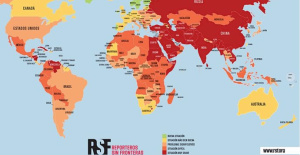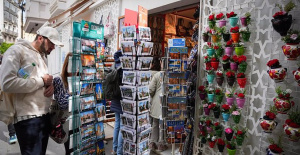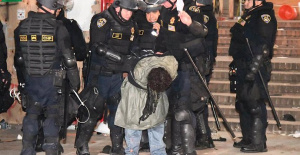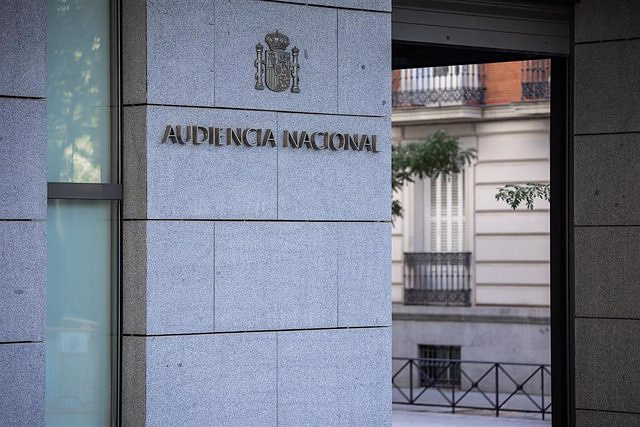The Prosecutor's Office opposes handing it over, underlining "the evidence" that it was not at the place and date of the events
MADRID, 19 Feb. (EUROPA PRESS) -
The National Court (AN) holds an extradition hearing this Monday to decide whether to deliver to Mexico the Venezuelan model Yorbriele Ninoska Vásquez Álvarez, accused of recruiting young people under the promise of working as hostesses to force them into prostitution, something to which the Prosecutor's Office is opposed.
According to the account of the facts contained in the letter of the Spanish Prosecutor's Office, to which Europa Press has had access, Vásquez Álvarez, "allegedly, in concert with other people who are not identified, in August 2021, using deception, made an offer of I work as flight attendants for two people, when what I really wanted was to force them to practice prostitution for their benefit".
Thus, he made an appointment with the girls agreeing to hire them to work as hostesses at events scheduled for that month of September in Mexico City and, "once their trust had been earned", already in October, he summoned them again in a hotel where they worked. of hostesses.
However, "at the end he told them to go up to their respective rooms where he threatened them to have sexual relations with two people attending the event, who paid for such services" to Vásquez Álvarez.
The Prosecutor's Office explains that in Mexico these acts are punished as human trafficking in its modality of sexual exploitation, illegal that in Spanish law is equivalent to a crime related to prostitution and sexual exploitation, and crimes of sexual assault.
However, it indicates that, "without prejudice to the foregoing, the defendant has provided documents that give credibility to her allegation that the claim is instigated by her ex-partner, who has threatened her with revenge for having broken their relationship ".
"From his analysis, it can be deduced the serious situation of threat to life that affects the defendant," says the Public Ministry, detailing that his ex-partner "flaunts" his "contacts with authorities supposedly managed by him" against her .
To this he adds "the evidence" that Vásquez Álvarez was not "at the place and date of the alleged events", judging by a series of international flights, some with a stopover in Madrid.
"In this way and in this context, it is worth highlighting the laconic nature of the alleged facts and the absence of incriminating data, beyond the mere manifestation of the same without the contribution of testimonies or inquiries about their presence at the place of the murders. facts," he says.
However, the Prosecutor's Office states that, "although, in principle, circumstances relating to the merits of the matter cannot be opposed to the request for surrender, there is an exception based on the manifest impossibility of committing the acts due to objective circumstances."
In this case, it believes that "the reason for refusal exists", taking into account "the doubtful location of the defendant at the moment in which the claimant authorities place her in Mexico City and the reasonable doubt about the instigation of her ex-partner as the motor of the penal action directed against her".
Consequently, although the other legal requirements for her extradition are met -such as double jeopardy-, the Public Ministry advocates not turning her over to the Mexican authorities.

 Exploring Cardano: Inner Workings and Advantages of this Cryptocurrency
Exploring Cardano: Inner Workings and Advantages of this Cryptocurrency Seville.- Economy.- Innova.- STSA inaugurates its new painting and sealing hangar in San Pablo, for 18 million
Seville.- Economy.- Innova.- STSA inaugurates its new painting and sealing hangar in San Pablo, for 18 million Innova.- More than 300 volunteers join the Andalucía Compromiso Digital network in one month to facilitate access to ICT
Innova.- More than 300 volunteers join the Andalucía Compromiso Digital network in one month to facilitate access to ICT Innova.-AMP.- Ayesa acquires 51% of Sadiel, which will create new technological engineering products and expand markets
Innova.-AMP.- Ayesa acquires 51% of Sadiel, which will create new technological engineering products and expand markets Spain moves from 36th to 30th place in RSF's world press freedom ranking but political pressure increases
Spain moves from 36th to 30th place in RSF's world press freedom ranking but political pressure increases Spain receives 16.1 million tourists until March and registers the best first quarter in history
Spain receives 16.1 million tourists until March and registers the best first quarter in history More than 2,000 arrested during pro-Palestinian protests at US universities
More than 2,000 arrested during pro-Palestinian protests at US universities Illa advocates for a "transversal" Government and Junts rules out agreeing with the socialists
Illa advocates for a "transversal" Government and Junts rules out agreeing with the socialists How Blockchain in being used to shape the future
How Blockchain in being used to shape the future Not just BTC and ETH: Here Are Some More Interesting Coins Worth Focusing on
Not just BTC and ETH: Here Are Some More Interesting Coins Worth Focusing on UPV students design an app that helps improve the ventilation of homes in the face of high temperatures
UPV students design an app that helps improve the ventilation of homes in the face of high temperatures Ivace and promotes a less invasive device for the early detection of prostate cancer
Ivace and promotes a less invasive device for the early detection of prostate cancer Valencia unanimously approves the ordinance to allocate spaces to test innovative initiatives
Valencia unanimously approves the ordinance to allocate spaces to test innovative initiatives UPV researchers promote a paid master's degree as a "talent factory" in integrated photonics
UPV researchers promote a paid master's degree as a "talent factory" in integrated photonics A million people demonstrate in France against Macron's pension reform
A million people demonstrate in France against Macron's pension reform Russia launches several missiles against "critical infrastructure" in the city of Zaporizhia
Russia launches several missiles against "critical infrastructure" in the city of Zaporizhia A "procession" remembers the dead of the Calabria shipwreck as bodies continue to wash up on the shore
A "procession" remembers the dead of the Calabria shipwreck as bodies continue to wash up on the shore Prison sentences handed down for three prominent Hong Kong pro-democracy activists
Prison sentences handed down for three prominent Hong Kong pro-democracy activists ETH continues to leave trading platforms, Ethereum balance on exchanges lowest in 3 years
ETH continues to leave trading platforms, Ethereum balance on exchanges lowest in 3 years Investors invest $450 million in Consensys, Ethereum incubator now valued at $7 billion
Investors invest $450 million in Consensys, Ethereum incubator now valued at $7 billion Alchemy Integrates Ethereum L2 Product Starknet to Enhance Web3 Scalability at a Price 100x Lower Than L1 Fees
Alchemy Integrates Ethereum L2 Product Starknet to Enhance Web3 Scalability at a Price 100x Lower Than L1 Fees Mining Report: Bitcoin's Electricity Consumption Declines by 25% in Q1 2022
Mining Report: Bitcoin's Electricity Consumption Declines by 25% in Q1 2022 Oil-to-Bitcoin Mining Firm Crusoe Energy Systems Raised $505 Million
Oil-to-Bitcoin Mining Firm Crusoe Energy Systems Raised $505 Million Microbt reveals the latest Bitcoin mining rigs -- Machines produce up to 126 TH/s with custom 5nm chip design
Microbt reveals the latest Bitcoin mining rigs -- Machines produce up to 126 TH/s with custom 5nm chip design Bitcoin's Mining Difficulty Hits a Lifetime High, With More Than 90% of BTC Supply Issued
Bitcoin's Mining Difficulty Hits a Lifetime High, With More Than 90% of BTC Supply Issued The Biggest Movers are Near, EOS, and RUNE during Friday's Selloff
The Biggest Movers are Near, EOS, and RUNE during Friday's Selloff Global Markets Spooked by a Hawkish Fed and Covid, Stocks and Crypto Gain After Musk Buys Twitter
Global Markets Spooked by a Hawkish Fed and Covid, Stocks and Crypto Gain After Musk Buys Twitter Bitso to offset carbon emissions from the Trading Platform's ERC20, ETH, and BTC Transactions
Bitso to offset carbon emissions from the Trading Platform's ERC20, ETH, and BTC Transactions Draftkings Announces 2022 College Hoops NFT Selection for March Madness
Draftkings Announces 2022 College Hoops NFT Selection for March Madness























